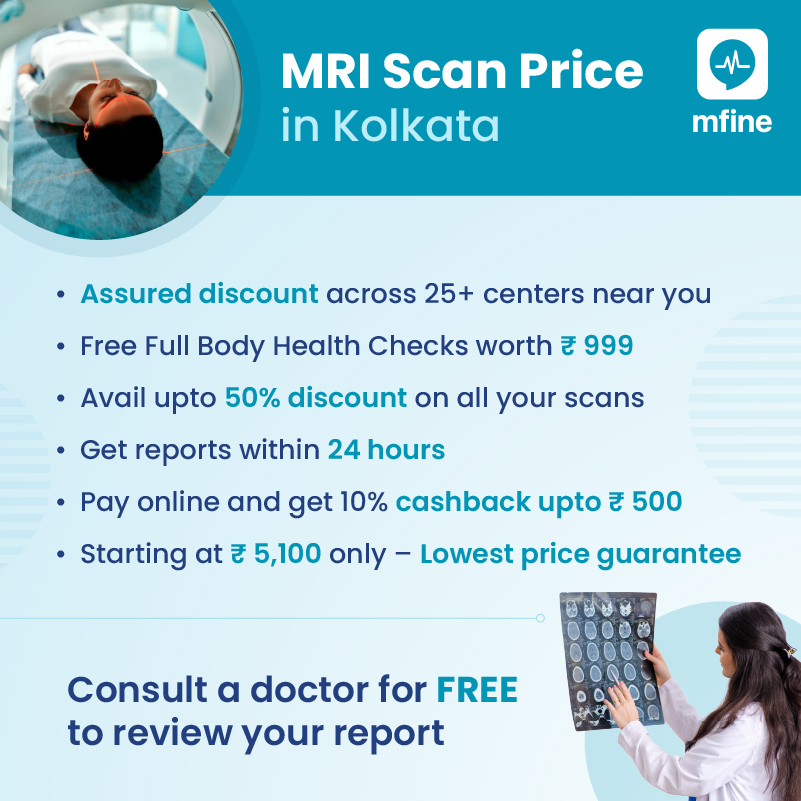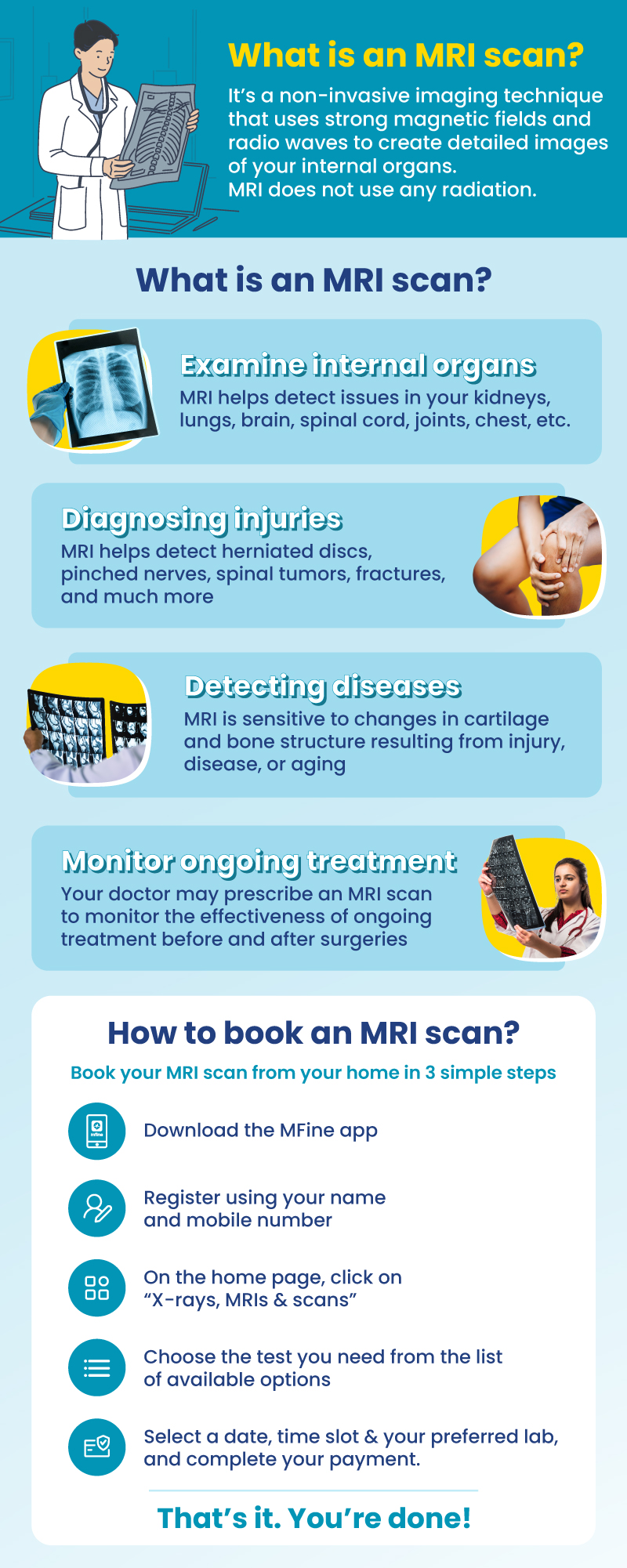
Looking for affordable Brain MRI scans without compromising quality? MFine has you covered in Kolkata with up to a 50% discount on Brain MRI scan costs and access to high-quality lab options.
MRI Scan in Kolkata by MFine
|
Unbelievable savings on MRI scans in Kolkata only with MFine! Pay just ₹ 5,100 instead of the regular market price of ₹ 8,000.
Get in touch with us at:
Or click the button below for a callback and avail of this limited offer. Don’t compromise on your health; choose affordable and reliable healthcare with MFine!
You can book an online doctor consultation after booking the test.Brain MRI scan costs in Kolkata
Find the discounted rates for the most common Brain MRI scans conducted in Kolkata, mentioned below. As prices are subject to change, we recommend reaching out to us for the latest updates.
| MRI Brain Scan | Starting Price |
| MRI Brain Scan Price in Kolkata | ₹5100 |
| MRI Brain Contrast Price in Kolkata | ₹8400 |
There’s no one-size-fits-all approach when it comes to MRI Brain Scans. Reach out to us at ☏08061970525, and we’ll guide you through the different protocols available and assist you in booking a time and location that suits you best.
Why should I book an MRI through MFine?
|
Exclusive Benefits with MFine
(1) Certified labs
Get access to over 600+ labs certified by NABL and NABH
(2) Same-day slot available
Get scans done on the same day
(3) Quick and convenient
Get reports in 12 hours and digital films in 15 – 20 minutes
(4) FREE Consultation
Post scans, consult a doctor for free to review your report
What is a Brain MRI Scan?
When it comes to investigating your brain, a Brain MRI Scan is the most sensitive imaging test available. This painless procedure employs strong electromagnetic and radio waves to generate clear images of various head structures, such as:
- Brain
- Skull
- Facial bones
- Nerves
- Inner structures of your ears
- Eyes
- Other soft tissues like fat, bones, and connective tissues in your head.
Remarkably, MRIs do not use ionizing radiation, ensuring the safety of patients.

What is a brain MRI with contrast?
Adding a contrast agent to a brain MRI intravenously enhances image clarity and precision. The contrast agent improves the visibility of important brain features, including:
- Blood vessels
- Tumors
- Inflammation
- Blood supply
- Fluid leaks
- Hemorrhage
- White matter disease, and others.
This diagnostic approach aids in the detection of strokes, multiple sclerosis, dementia, brain infections, and more.
It’s important to note that contrast materials are generally safe, with severe reactions being exceptionally rare.
Why would a doctor prescribe an MRI of the brain?
A doctor may order a brain MRI to diagnose various neurological conditions, including:
- Strokes
- Dementia
- Encephalitis (brain infection)
- Brain aneurysm (a bulge in the blood vessel)
- Brain hemorrhage (bleeding in the brain tissue)
- Brain damage due to Epilepsy
- Multiple sclerosis (damage to nerve fibers)
- Pituitary gland diseases
- Traumatic brain injuries
- Migraines
- Seizures
- Hearing loss
- Hormonal imbalances related to the hypothalamus
- Extreme fatigue and weakness
- Significant changes in your thinking and behavior, etc.
What are the prerequisites for a Brain MRI scan?
Prior to a Brain MRI scan, certain prerequisites are essential:
- Doctor’s Referral: A doctor’s recommendation is typically required before scheduling an MRI scan. This is essential as the physician will determine the necessity of the procedure based on the patient’s symptoms, medical history, and other relevant factors.
- Medical History: Providing a comprehensive medical history is vital for the accurate interpretation of MRI results. Previous brain-related conditions, such as strokes, tumors, or traumatic brain injuries, could impact the findings and influence the treatment plan. Additionally, the medical history may reveal any contraindications or special considerations for the MRI scan.
- Allergies: Patients must disclose any known allergies, especially to contrast agents. In some cases, a contrast-enhanced MRI may be necessary to obtain clearer images of certain brain structures. However, these contrast agents may cause allergic reactions in some individuals, so informing the medical team is crucial to avoid complications.
- Pregnancy: For female patients, it is essential to notify the healthcare provider if they are pregnant or suspect they might be pregnant. MRI scans are generally avoided during the first trimester due to potential risks to the developing fetus. The medical team can then determine alternative imaging methods or postpone the MRI until it is safer for the mother and baby.
- Metal Implants or Devices: Metal objects within the body can significantly affect the MRI results. Informing the medical team about any metal implants, such as pacemakers, surgical clips, or joint replacements, is essential to ensure the patient’s safety. In some cases, MRI may not be recommended for individuals with certain metal implants, as the strong magnetic fields can cause displacement or heating of the metal objects, potentially leading to serious complications.
- Claustrophobia: Patients who suffer from claustrophobia, a fear of enclosed spaces, may experience significant discomfort during an MRI scan. Informing the healthcare team in advance allows them to take appropriate measures to address this concern. They may offer sedation or use open MRI machines that provide a more spacious environment, helping the patient feel more at ease during the procedure.
- Medications and Medical Conditions: Patients should provide a complete list of all medications they are taking, including over-the-counter drugs and supplements. Certain medications can interact with MRI contrast agents or alter the MRI results. Additionally, patients with certain medical conditions, such as kidney problems or diabetes, may require special considerations before undergoing an MRI scan.
- Fasting: In some cases, patients may need to fast before the MRI scan, especially if abdominal imaging is also required. Fasting helps improve the visualization of certain structures and ensures the accuracy of the results.
- Patient Preparation: The healthcare team will provide specific instructions on how to prepare for the MRI scan. This may include avoiding the consumption of certain foods or beverages, removing jewelry or metallic objects, and wearing comfortable clothing without metal fasteners.
FAQs
What is the cost of a brain MRI in Kolkata?
The usual market price for a Brain MRI in Kolkata is above ₹ 8,000 but with MFine, you can get it done for just ₹ 5,100.
What does a CT scan vs. MRI of the brain show?
CT scans are particularly useful for detecting acute conditions such as bleeding, fractures, or bone abnormalities. CT scans are relatively quick and are often used in emergency situations.
On the other hand, MRIs are useful in detecting soft tissues of the brain, like the brain’s white and gray matter, as well as detecting abnormalities like tumors, multiple sclerosis lesions, and other neurological disorders.
Which is safer, MRI or CT scan?
Both MRI and CT scans are considered safe and non-invasive imaging techniques. However, certain factors may influence which scan is more suitable for a particular individual:
- Radiation Exposure: CT scans involve X-ray radiation, which can accumulate over time, especially with multiple scans. MRI, on the other hand, does not use ionizing radiation, making it safer in terms of radiation exposure.
- Contrast Agents: In some cases, both MRI and CT scans may require the use of contrast agents to enhance imaging. Allergic reactions to these agents are more common in CT scans, making MRI a safer option for individuals with known contrast agent allergies.
- Contraindications: MRI is generally not recommended for individuals with certain metal implants or devices due to the strong magnetic fields. In such cases, a CT scan may be a safer alternative.
Read a complete blog on CT scans Vs. MRI Scan: Which is better?
What can an MRI reveal that a CT scan cannot?
An MRI can reveal more detailed information about soft tissues, making it superior to a CT scan in the following aspects:
- Brain Tissue Differentiation: MRI can clearly distinguish between different types of brain tissues, such as white matter, gray matter, and cerebrospinal fluid. This ability allows for better visualization of neurological structures and abnormalities.
- Tumor Characterization: MRI provides detailed information about the nature and extent of brain tumors, aiding in precise diagnosis and treatment planning. It can differentiate between benign and malignant tumors, assess vascularity, and detect small lesions that may be missed on CT scans.
- Neurological Disorders: MRI is highly effective in detecting conditions like multiple sclerosis, strokes, and other neurological disorders that affect the brain’s soft tissues.
Can a brain tumor show up on an MRI but not a CT scan?
Yes, brain tumors can sometimes show up on an MRI but not on a CT scan, especially in the early stages or in cases where the tumor has a predominantly soft tissue component. MRI’s superior soft tissue contrast allows for better visualization of brain tumors, which can be challenging to detect using CT scans, particularly when the tumors are small or located in certain regions of the brain.
Does a brain MRI include the neck?
A standard brain MRI does not typically include imaging of the neck. However, in certain situations where there is a need to evaluate the brain’s lower parts and structures near the base of the skull, the neck region may be included in the imaging field. This is commonly referred to as a “brain and neck MRI” and is usually done if there are specific clinical indications for examining both areas.
Other topics you may be interested in
| For further assistance call us on ☏08061970525 |

 Call us:
Call us:


 Call
Now
Call
Now